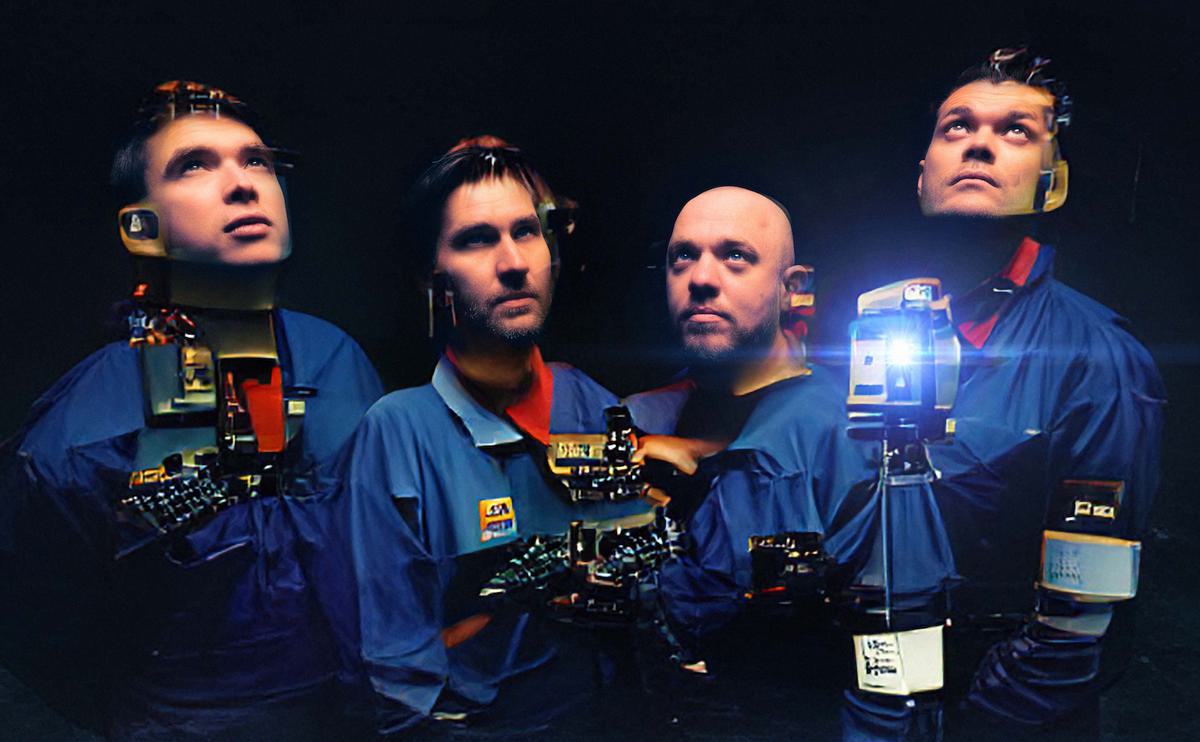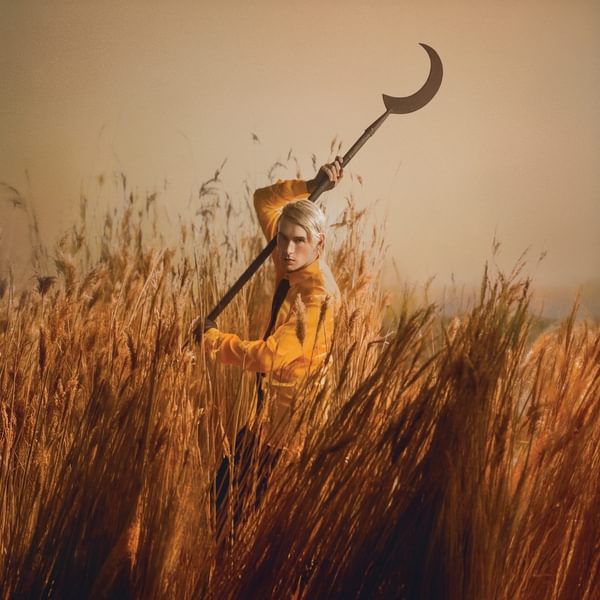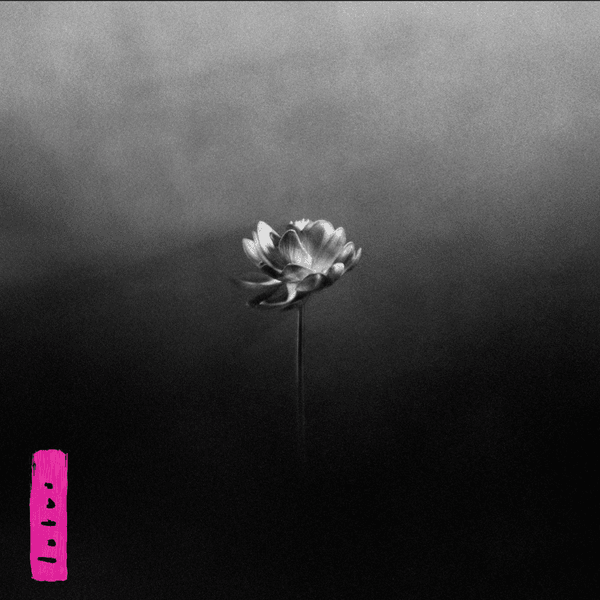
Love and Robots
Everything Everything's Jonathan Higgs explains the personal Everests - and technological innovations - behind the band's most pop album yet.
In June of last year, Everything Everything fans were caught off-guard by the single “Mercury and Me”.
In place of the band’s usual intellectualising was a plaintive piano ballad; an unambiguous chronicle of lead singer Jonathan Higgs’ post breakup torment. The second verse’s lament – “I don’t think I’ll ever be a real person” – must have struck a chord with the many who’ve tried, and tumbled, in the supposedly life-affirming pursuit of romantic love.
“It was actually the first thing written for Reanimator,” Higgs tells me. “And when it came out, people were texting me asking whether I was OK.” The short answer was: sort of. “I said, ‘This was written a long-ass time ago. I'm fine.’ But there was no messing around with that one. This really was the end of something and I didn’t feel very good. I could have written that a million times before – I have – but I've always somehow obscured it. This time, there's just no obscuring.”
“I'm probably not gonna need to write that kind of song ever again.”
In some ways, Higgs’ confidence in this statement checks out. On new album Raw Data Feel, there are some familiar and not-so-familiar techniques in play that distance the singer from his recent trauma – not least the curious new character Kevin, who features as a kind of avatar. Even in conversation, Higgs’ past relationship is invoked through euphemism and wry asides – whether through a desire to project himself or others. But the album marks a shift for the band as a whole, towards something more open, less cynical and far more personal. It is the sound of coming unstuck.

“I knew I had this thing ahead of me after Reanimator,” explains Higgs. “I had to write a whole album. And it was during a period where I was like, ‘I just absolutely cannot keep writing about this same thing, especially seeing as that's just really ended; for real, forever’. I've written probably 40 songs about the same subject, whether people know that or not.”
There was a moment from a few years back that helped Higgs realise just how stuck he’d been. The band were in the van, touring A Fever Dream – their woozy, electronica-heavy fourth album – and someone accidentally put on the band’s frantic single “Qwerty Finger” from their debut Man Alive. “And I remember – it gets to the end of the track and I'm just screaming, ‘I can't do what you asked me’. And at the time, we had just put out the single “Can't Do” … and I was literally can't-doing the same thing in my life. And I just realised, listening to this younger me – yowling – nothing has actually changed since I wrote that song. It made me feel awful.”
As much as song-writing can be a valuable tool for reflection, Higgs agrees that practical change is a different ball-game. “I can look back at a younger me and make all sorts of judgments. Even if I was trying to explore myself and chronicling my problems through my music, I didn't really have a clue. I didn't have the wherewithal to actually solve them.”
In 2020, things in his life had started to change and Higgs found a new catharsis in making art. During the first lockdown, he produced the video for “In Birdsong”, using the animation studio Blender (a skill that would later win him the Jury Prize at Brazil's M-V-F Music Video Awards). In the last frames, the camera zooms out to reveal the fox from the cover of Man Alive, lying lifeless on a square of grass. “It’s funny…. I remember that one of the comments on YouTube just said, 'This feels like goodbye'. That fox represented a certain thing in my life, and that really was the very end of it. This person had clocked it.”
Raw Data Feel resounds with this goodbye. But it is, Higgs says, the band’s most positive album - even sappy in places, with a raft of rather sincere love songs. Recent single “I Want a Love Like This”, a driving declaration of new love, is a notable departure from the low-key doom that band often deals in - if you ignore the bridge about someone dying. Asked if he’ll ever be able to write a lyric without injecting some shade of dystopia, Higgs laughs. “I really was trying but I guess it's just not possible.”
This budding brand of positivity is reflected in the album’s production, too, which makes liberal use of four-to-the-floor beats and popcorn synth hooks. Arrangements are designed for the main room: playful, spacious and notably unfussy. It’s interesting to think what the bands 20-something selves, who were desperate to reject anything slightly ‘done’, might make of this heartfelt lunge into pop. Higgs says it’s simply a combination of arrogance and isolationism which stopped them from doing this earlier.
“We tear each other's songs apart very quickly, very easily. Alex or I will write a song and then some point during the process, someone will say, ‘Oh, it sounds like something we really like’, which means we can't continue. Or it sounds like something terrible, like Scouting for Girls. And then we're also out. We really ruin each other's interpretations of our own music. And I think that results in a really, really high standard for what is allowed on record.”
Things changed around the band’s last album, Reanimator, when two of them left long-term relationships, and the other two had kids. “The dads in the band just want to make enjoyable music; they've got something very nice in their lives and they don't want to be make music with a weighty ‘drag you down’ overtone.” But new responsibilities came with new time constraints, and it suddenly wasn’t possible to escape to a studio for months on end and pour over every bar. “We were like, ‘What the hell we're doing? Why don't we allow ourselves the freedoms that other bands do?’ Let's do it rather than… ‘I must sit down and think about, you know, the bicameral mind for nine months and then make a record that nobody wants to listen to’.”
The resultant album ended up being pulled together in record time - three months - and was completely self-produced. “We wrote something that we think is fun. And there's lots of places where I'm just trying to make myself laugh, or I'm just trying to make you laugh. It's not going to change the world.”
You can tell Higgs is still surprised by his own lack of cynicism. Recently, when perusing a market stall in Manchester, he came across a wood engraving that mapped out all the famous acts that his home city has incubated. There, etched next to Joy Division and The Happy Mondays, was Everything Everything.
“I thought, ‘Oh my God, we've actually been accepted’. I never thought that would happen, especially the way we carried on when we first started out: ‘we hate it, we think it’s shit’. We didn't want anything to do with, you know, the legends.” He says he loves Oasis with such aplomb I’m not sure whether to take him seriously. “No, we listen to those bands,” he insists. “We just didn’t want to be associated with them. Now I'm very, very proud to be, even though we're obviously tiny compared to them. We're part of that pedigree or whatever.”
This reconnection with their home city might have helped fuel their collaboration with fellow natives Gang of Four. Everything Everything’s stomping cover of “Natural’s Not in It” appeared on The Problem of Leisure: A Celebration of Andy Gill and Gang of Four, alongside reworkings by Tom Morrello, Gary Numan, Warpaint and IDLES. Although Gill recorded the covers himself, the record took on a fresh significance when he passed away in February 2021, months before its release.
“The funniest thing about it for me was that you would expect someone like [Gill] to be very, very ‘authentic’ and have all this old equipment like a great amp that you plug into, a great guitar, a great microphone. In reality he plugged Alex's guitar directly in to the computer using a software amp. We did just one take for everything. And for a second, I thought, ‘What the hell? This isn't punk!’ And then I thought, actually, that is really powerful, because that's exactly what a fucking punk would do. We weren’t starstruck so much as found it quite surreal. Plus, [“Natural’s Not in It”] is actually harder than one of my songs to sing.”
I ask Higgs whether they have any rules about doing covers, given their past desire to want to distance themselves from … well, everyone. The main rule appears to be: don’t go anywhere near Radiohead. “We have lots of rules when it comes to Radiohead,” Higgs laughs. “Don't try and meet Tom, although Jez is now actually quite friendly with Ed so… We barely include them now when we’re doing comparisons of our tracks, because Radiohead have always somehow got there first. And we're always accusing ourselves of sounding like them and me singing like them and us doing our art like them. They never leave our collective consciousness, because they're easily our favourite and most formative band. So yeah, they're completely off limits. It would end the band for us.”

Thankfully, there are at least some things that set them apart from the alt-rock übermenschen. Everything Everything are still nerds for a concept album, and this time round, decided to ‘collaborate’ with AI on lyrics, song titles, and even marketing. The otherworldly landscapes that make up their recent single covers – of hillsides dotted with machine-made faces, and composites of butterflies and burning planes – were created by feeding strings of words into an image generator and seeing what it spat out. The results also used in the video for “I Want a Love Like This”, where the topography of the band’s image is churned through various disturbing wallpapers – including one with a lot of naked soldiers on a blood-stained battlefield. As ever, the band’s dystopic visions always find a way.
For the text-based contributions, Higgs worked with developer Mark Hanslip to create a lyric-generating programme, which he fed the full Terms and Conditions of LinkedIn, Beowolf, the works of Confucius… and 400,000 4chan comments. Its voice – simultaneously vulgar, corporate and philosophically empty – would come to reflect Higgs’ own discomfort with communications in the internet age.
“I literally took the most boring and draconian thing I could find – the LinkedIn Ts and Cs – and shoved it next to an epic poem. And then I wanted 4chan for a sprinkling of like, modern parlance, slang, swearing or just kind of … dark shit, something for clearly from now. And then there’s Confucius bringing up the rear, making it very po-faced. I wanted to see how an AI would try to bring them together.” To extract lyrics from the algorithm, Higgs sent prompts to developer Hanslip, often questions or sentences to complete. His favourite response was when he sent the AI the words “what now”, and received back “what now my prominent clit?”. “Software Greatman” – the title of the album’s simmering closer – also bubbled up from the mess of late-capitalist lingo and ancient epics. “Towards the end of that track, my voice starts getting very sampled and crushed, I sort of go into the computer basically… That's why we put it at the end. It's got this feeling of me going, ‘You know what – fuck it I'm out. I'm going in back inside’.”
This merging of man and machine is teased through the album. “Bad Friday” conflates drunken memory loss with malfunctioning RAM, when the band puncture the refrain “I can never remember in the morning” with a ‘bonk’ of a Windows 95 error message. Elsewhere, Higgs’ new-found honesty is undermined by a need to simply avoid reality through distraction. New single “Pizza Boy” – a blinder of a track so accessible it could almost be mistaken for Phoenix – centres around the chorus: “Is it fun on your own? Just you and your mobile phone?”. It’s a particularly stinging line for those of us who’ve spent the last few pandemic-gulfed years isolated and doom-scrolling. “Yeah. That’s a dig at myself, really” he says. “We all rely on technology to get us through stuff.”

The character of Kevin – whose bland moniker appears both in lyrics of the album and its credits – is also doing a good deal of the emotional labour. Higgs describes him as a “proxy” for talking about difficult subjects; a stand-in of sorts. “It's so happens that I still can't say ‘me’ [when I’m writing]. That character helps me to explore stuff I didn't want to directly interact with,” Higgs admits. “But it’s very vague as to what his story is… it's not like a proper narrative. It's just sort of snatches. On other records I'm saying, ‘Oh, I'm sad about this. Oh, this happened to me’. On this record, I've really deliberately said this happened to Kevin. Kevin did this and ‘What about this, Kevin? … Are you going to be OK, Kevin?’”
As with all coping mechanisms, though, Higgs will have to find another one eventually. I question whether the band always need to have some kind of grand narrative or technological innovation to tie each album too, and find he’s already thinking about the next one. “Well, we can’t push the technology angle any further than we have. I did jokingly suggest to the guys that we do the next one with no click which basically means we can't use any backing tracks and wipes out a lot of technology. A back to basics album. But that's boring me even telling you about it.”
At the root of it – and despite the almost unnerving consistency of their output – Everything Everything share the same fear that surely befalls most bands who’ve been together for over a decade: a fear of repeating themselves. “Right now, [finding inspiration] seems impossible, but it does every time at this point, and I do always somehow find something. Maybe the next record after this, when I’ve sorted out my mind a bit all I’ll have to say is: ‘You know what? I'm happy now.”
“We'll see how terrible that is.”
Get the Best Fit take on the week in music direct to your inbox every Friday

Patrick Wolf
Crying The Neck







